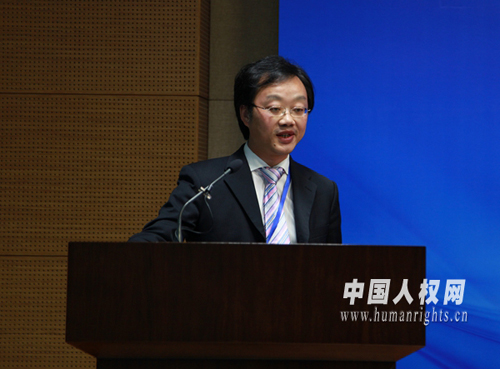
June 14, 2017 -- Zheng Ge, professor of Koguan School of Law, Shanghai Jiao Tong University and researcher of China Society for Human Rights Studies (CSHRS), delivers a speech. (Photo: Jiao Fei/ chinahumanrights.org)
June 14, 2017 -- The Seminar on Building a Community of Shared Future for Mankind and Global Human Rights Governance was held in Nankai University, Tianjin on June 8th. It was co-sponsored by China Society for Human Rights Studies (CSHRS) and the Publicity Department of Tianjin and organized by Nankai University. Zheng Ge, professor of Koguan School of Law, Shanghai Jiao Tong University and researcher of the CSHRS, attended the seminar and delivered a speech on From the Five Principles of Peaceful Coexistence to Building a Community of Shared Future for Mankind.
In an interview with chinahumanrights.org, Zheng Ge explained his ideas.
chinahumanrights.org: In your speech, you mentioned the idea of building a community of shared future for mankind developed from the Five Principles of Peaceful Coexistence. Could you explain how it happened?
Professor Zheng: The Five Principles of Peaceful Coexistence was established by referring to the principles of the UN Charter and other critical international conventions. They were regarded as guiding principles for China’s foreign policies and then included in the preface of the Constitution of the PRC. If human rights are used as excuses to interfere in other nation’s internal affairs, global fairness and justice will disappear, and worse still, social order in the nations being interfered and the well-being of their people will not be ensured. The Five Principles of Peaceful Coexistence can stop superpowers from interfering in other nation’s internal affairs on the pretext of “human rights overriding sovereignty”. Only when every sovereign country is able to independently realize its economic growth, will it realize independence and self-reliance and enjoy equality in international relations. In the preliminary stage of China’s modernization, there were the Five Principles of Peaceful Coexistence serving as defensive foreign policies. As China makes fruitful achievements in its economic development, it is the positive idea of building a community of shared future for mankind that helps this nation actively fulfill its international obligations and make contributions to the humankind’s common development.
chinahumanrights.org: Could you explain how the idea of a community of shared future for mankind is reflected in the Belt and Road Initiative?
Professor Zheng: The idea of a community of shared future for mankind regards pursuing common development and dealing with problems arising from the development as its main principles. It is put forward by drawing on experience from China’s reform and opening up and external economic development. The Belt and Road Initiative launched by China aims to help developing countries with infrastructure improvements and to enhance their “blood -making” capacity and sustainable economic development as well, realizing mutual benefit and win-win progress through common development. Under the Belt and Road Initiative, material basis of a community of shared future for mankind will be founded, which will help produce a relationship featuring equality and interdependence, mutual help and mutual benefit among countries instead of making the world a jungle under rampant social Darwinism.


